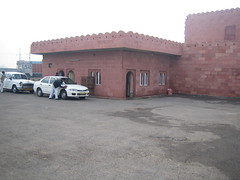2005/06/26
When fossil fuels run out
...where will you be?
Since finishing my first read through Jim Kunstler's The Long Emergency, I've stopped planning for what I would do if the fossil fuel reserves effectively ran dry tomorrow. Realistically, tomorrow would be too late; planning for such a catastrophic failure happening tomorrow would probably be a waste of time.
Instead, I'm planning for the gradual decay of infrastructure over the next decade.
Next Actions:On one hand, it's tempting to move to a larger, more self-sustainable patch of property and build to sustainable specifications from scratch. On the other, the area we live in is not that bad as far as suburbs go. We're walking distance from the Fallowfield VIA Rail stop, which is also a major OC Transpo stop.
- Reduce electricity consumption
- Buy Watt meter from OSP or Arbour to measure power drain @ plug.
- Replace or reconfigure power-draining equipment (phantom loads, etc)
- Investigate solar heating options
- Wait for CSA approval of systems
- Investigate photovoltaic options
- batteries back-up
- grid intertie
- Investigate wind micropower options
- batteries back-up
- grid intertie
- Investigate closed-loop geothermal systems
- Backyard greenhouse
- cold-frame design to work through winter
- solar power/charged red LED night lights
- Insect control
- bird boxes
- bat boxes
To be honest, I don't know how to prepare for this. We have reasonably accurate global climate cycle measurements derived from polar ice cores dating back tens of thousands of years. However, the depletion of fossil fuel reserves over the past century has been releasing quantities of carbon back into the environment that haven't been seen in millions of years, so all we have to go on are fossil records documenting long-extinct ecosystems.
More to ponder...
2005/06/23
Personal Fabrication Intellectual Property Rights
I just finished reading Fab the other day and a most intriguing question came to mind.
What place will patents have in an age of personal fabrication?
Think about it. A patent is a set of exclusive rights granted by a government to a person for a fixed period of time in exchange for the regulated, public disclosure of certain details of an invention.
This works in an industrial, mass-production economic setting where a patent is implemented many times over and sold to some consumer; a portion of the sale returns to the patent holder by way of the licensing agreement. The patent's use in a product is what is licensed, not (disclaimer: IANAL) the actual implementation being produced; the use is more general than the implementation. That specific implementation would be covered under Industrial Design Rights, or at least some sort of Copyright for the plans+schematics. A patent could theoretically be licensed and enforced on a per-personal-fabricator basis, but that would probably not be an economically viable approach, though I am sure lawyers would be most happy to oblige.
I could write a book on how to build your own PC motherboard from scratch (off-shelf parts), detailing a system whose implementation (how everything hooks up) would definitely span many active patents. As long as you build it for yourself, not to sell, you don't have any licensing fees to pay. Depending on how I copyright my book, you may or may not have to pay royalties on any copies of the book made, but that's all.
Like a musician playing from sheet music, a personal fabricator would be "performing" the recipe. A new score of an old (public domain) song would be covered by copyright with respect to copying the score, but not performing the song. Performing from a score for a new (copyright active) song would have licensing fees attached, but again that's only if the piece is delivered to the public at large in a local pub or concert hall; I can still play it in the privacy of my own home, probably to a private audience.
The case you make for your PC, assuming it's an original design by you, could be covered under ID rights, and pictures taken of it would be copyrightable. If the case is a scale model of the Starship Enterprise then it's still yours to own but probably not to sell without paying licensing rights to Paramount Pictures, and taking pictures of it for profit would probably also be subject to copyright and licensing requirements.
In a mass-personal-fabrication society, what is the point of patenting anything? I could write, copyright and sell "how to use my invention" instructions.
I could provide you with the "build me" compiled object to feed the personal fab equipment. This would be copyrightable and probably ID protectable in some fashion... This could almost qualify as a software patentable entity, but at best it's a virtual bits-implementation of final atoms-product.
Can a better-mousetrap patent be applied to a virtual implementation of said patent? Only if it works to catch virtual mice.?.
More to ponder...
Edited to add: I think this will land up being part one of something, since these thoughts were swimming in a pool of contemplation after having read The Long Emergency. This is personal fabrication in a post-fossil-fuel infrastructure context, where the increased costs of energy required for mass production and proliferation skew the picture.
2005/06/21
Clothbot Concepts
It started with some discussions on the wearable computing list, wear-hard.
A more organic approach to machine design. Perhaps the oldest of machines, superceded only by the spinning wheel, the loom goes back thousands of years. Where broken tools and pottery shards lie in dust, cloth wraps the bodies of the dead.
In order to blend in with society, a robot needs to simply be part of the environment. In order to be a part of the environment, a robot needs to be designed with sustainability in mind.
While a solar cell generates electricity directly, a Stirling engine is orders of magnitude more flexible and easier to repair with the most basic of tools. Unlike the vaporized water required by a steam engine or the burning fuel used in an internal combustion engine, all a Stirling engine requires to function is a temperature difference. Naturally some designs will be optimized for specific environments in order to operate more efficiently, but the underlying principle remains the same; apply heat to one end and/or cool off the other.
A household Clothbot, powered by Stirling engine, would be equally at home absorbing heat from the sun or hearth, and cooling in the shade or earth.
As the Long Emergency comes to pass, will this communal web of information and knowledge free itself from the industrial ties? Or will it vanish once more through repeated history?
[At the rate I'm going - started writing on June 10th - I'll never get this up. Putting it up now.]
2005/06/14
Robertson screws
It's one of those things I've always used, because my dad used them:
Robertson screws.
a.k.a square drive screws.
Whenever I buy a piece of assemble-yourself furniture that uses cross or flat head screws, I swap in an equivalent Robertson. Hex screws I don't mind; they're just as effective.
If you're gonna screw, screw with the best!
Bicycle Business
While in San Jose last week, I decided to start looking into how feasible it might be for me bike places (including from the airport to the hotel) instead of renting a car.
Much as Dan Gilmour notes with respect to auto travelling, 511.org has a whole section devoted to bicycling.
First things first. Must get set up to ride to work and back on a regular basis.
2005/06/07
Bluetooth UPS
I was reading through the Technology Review newsletter I get every day and one article title jumped out at me.
One Decision: UPS Goes Bluetooth
Immediately, the wheels started to turn in my mind. Imagine what one could do in a home where non-essential equipment power consumption was controllable by bluetooth...
...but it wasn't that kind of UPS; it was the other kind.
Ooops!
Make it your own
One of the more lasting ways to effect change in life is to find ways to make it your own.
With that in mind, I had started the Personal Mantras page at 43FoldersWiki. Looks like it's really taken off!
Cool!
2005/06/03
Beyond Expectations
Having traveled as much as I have these past few years, I have come to appreciate the little things.
For the most part, my expectations of people have fallen pretty much to what Seth experienced in We don't have to care, part I. As a result, I usually enter a zen-like trance while traveling and let what will happen, happen. Life is too short to get stressed out by other people's shortcomings.
However, as in part II, when someone makes an effort, it is noticeable and all the more appreciated. My trip to India in February made it all too clear to me just how low my expections of North American travel and hospitality have fallen.
Over there, real humans do everything, including answer the phone!
...and keep the coffee and tea station clean and stocked...
...and man their post at the printer & copier, stacking copies as the come out, binding if necessary and keeping the feeder trays topped up...
...and pick up your parcels once they're packed up, while you visit the next site/shop.
Coming from North America, it's a strange experience. You have to let go of your do-everything-yourself approach and let people do the job they're paid to do, no matter how insignificant it may seem. The coffee station guy does coffee all day, that's it. The printer guy does his thing and takes home a paycheque, that's all.
Once I started to get over that, I realized I had to also let go of my Canadian thank-everyone-for-everything habit; it was getting a little ridiculous. But it did mean the coffee guy always had a smile for me as he prepared my cup'o, and my driver made a quick, unscheduled stop on the way back from the Taj Mahal to buy me some Turkish Delight-style sweets.
Assuming we survive the coming ecopolypse, I'd definitely like to go back, but only in winter. I feel uncomfortable at 24C over here; at 40-50C and humid during their summer, I dread to think how my body would react.
Finally, to wrap up today's entry, it seems that Air Canada was ranked Best Airline in North America in international survey of air travellers. Yes, I believe it.
When I'm able, I try to use AC for my US-bound trips. But more often than not I default to my second choice of American Airlines so I can make my connecting flights on the US side instead of Toronto. It's a real pain having to pass through security once to get on a local Ottawa-Toronto flight, then exit and collect all my stuff (I try to avoid checking baggage in this situation), and go through customs and security (a second time) to get on my Toronto-US flight. When flying AA I prefer to go Ottawa-Chicago-wherever so I clear customs and security once in Ottawa and am in the system the rest of the way.
I could fly Air Canada from Ottawa to US, but then I'd be stuck flying United or US Airlines on the connecting flight, and even the flight out is usually a code-share, non-AC plane. The larger AA planes really do have more room than the equivalent on the others.
All that said, I leave for San Jose via San Francisco on Sunday to visit HQ and will be flying AC there, connecting in Chicago, and picking up the usual Hertz rental.
Aside: I highly recommend getting the NeverLost GPS equiped vehicles.
I'm the type of guy who resets his expectations on a regular basis on the off-chance someone improves something. Goes back to that life's too short statement at the beginning.
...I wish we had a decent, faster North American continental rail service, more like Europe and Japan. It would take longer, but on the few trips I've taken between Ottawa and Toronto (on VIA Rail; a first-class rail ticket costs less than an economy-class airplane ticket) you get to eat real food with real metal cutlery, your cellphone works, and you can work and wander around at your leisure. It's a great deal less stressful than air travel. Cross-country hotels on tracks.
2005/06/02
Ambient sensing
Just spotted this press release about a new solar-powered sensor module by EnOcean.
Now there is a company that gets it. As the Long Emergency plays out, implementations like these will take off.
Along this train of micro-power thought, why don't children's toys have solar chargers built in? They would certainly charge a lot faster outside than in, perhaps persuading more kids to go outside. Once such a toy reached the end of its' play-life the charger module could be reused elsewhere.
For the more mature (ab)user of power, more companies are coming out with alternatives to yet another brick on the wall.
2005/06/01
Portable videography
Looks like it's time to retire my iRiver PMP-120...
...because Archos has just released the SDK for their PMA-400 series devices! That's where iRiver failed to meet my expectations, with respect to embracing Linux as their PMP OS.
First idea that comes to mind is an all-in-one, non-linear video editing application. Would be ideal for all this talk of video blogging to replace audio-only podcasting.


